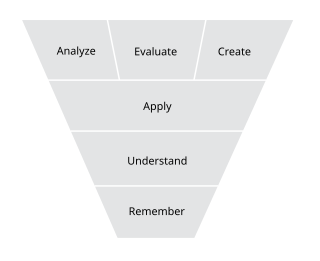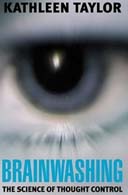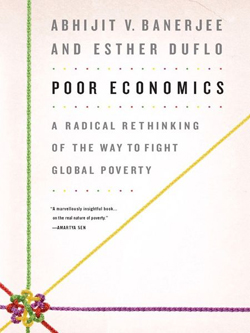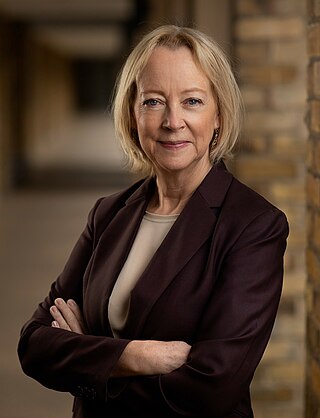
In their most common sense, the terms thought and thinking refer to cognitive processes that can happen independently of sensory stimulation. Their most paradigmatic forms are judging, reasoning, concept formation, problem solving, and deliberation. But other mental processes, like considering an idea, memory, or imagination, are also often included. These processes can happen internally independent of the sensory organs, unlike perception. But when understood in the widest sense, any mental event may be understood as a form of thinking, including perception and unconscious mental processes. In a slightly different sense, the term thought refers not to the mental processes themselves but to mental states or systems of ideas brought about by these processes.
Critical thinking is the analysis of available facts, evidence, observations, and arguments in order to form a judgement by the application of rational, skeptical, and unbiased analyses and evaluation. In modern times, the use of the phrase critical thinking can be traced to John Dewey, who used the phrase reflective thinking. The application of critical thinking includes self-directed, self-disciplined, self-monitored, and self-corrective habits of the mind; thus, a critical thinker is a person who practices the skills of critical thinking or has been trained and educated in its disciplines. Philosopher Richard W. Paul said that the mind of a critical thinker engages the person's intellectual abilities and personality traits. Critical thinking presupposes assent to rigorous standards of excellence and mindful command of their use in effective communication and problem solving, and a commitment to overcome egocentrism and sociocentrism.
Integrative thinking is a field that was developed by Graham Douglas in 1986. It is defined as the process of integrating intuition, reason, and imagination in a human mind to develop a holistic continuum of strategy, tactics, action, review, and evaluation. This may be achieved by applying the SOARA process to any problem. The SOARA Process facilitates finding associations between what may have been regarded as unrelated parts of a problem.

Piaget's theory of cognitive development, or his genetic epistemology, is a comprehensive theory about the nature and development of human intelligence. It was originated by the Swiss developmental psychologist Jean Piaget (1896–1980). The theory deals with the nature of knowledge itself and how humans gradually come to acquire, construct, and use it. Piaget's theory is mainly known as a developmental stage theory.

The Cynefin framework is a conceptual framework used to aid decision-making. Created in 1999 by Dave Snowden when he worked for IBM Global Services, it has been described as a "sense-making device". Cynefin is a Welsh word for 'habitat'.
Strategic thinking is a mental or thinking process applied by an individual in the context of achieving a goal or set of goals. As a cognitive activity, it produces thought.
Design thinking refers to the set of cognitive, strategic and practical procedures used by designers in the process of designing, and to the body of knowledge that has been developed about how people reason when engaging with design problems.

Higher-order thinking, also known as higher order thinking skills (HOTS), is a concept applied in relation to education reform and based on learning taxonomies. The idea is that some types of learning require more cognitive processing than others, but also have more generalized benefits. In Bloom's taxonomy, for example, skills involving analysis, evaluation and synthesis are thought to be of a higher order than the learning of facts and concepts using lower-order thinking skills, which require different learning and teaching methods. Higher-order thinking involves the learning of complex judgmental skills such as critical thinking and problem solving.
Richard A. D'Aveni is an American academic, thought leader, business consultant, bestselling author and the Bakala Professor of Strategy at the Tuck School of Business at Dartmouth College. He is best known for creating a new paradigm in business strategy and coining the term “hypercompetition” which led Fortune to liken him to a modern version of Sun Tzu.

Roger L. Martin is the former Dean of the Rotman School of Management at the University of Toronto from 1998 to 2013 and an author of several business books. Martin has expanded several important business concepts in use today, including integrative thinking. He has been recognized by several business publications as one of the field's most important thinkers.

Brainwashing: The Science of Thought Control is a 2004 popular science book explaining mind control, brainwashing, thought reform and coercive persuasion by neuroscientist and physiologist Kathleen Taylor. It explains the neurological basis for reasoning and cognition in the brain, and proposes that the self is changeable, and describes the physiology of neurological pathways. It reviews case studies including Patty Hearst, the Manson Family, and the mass murder/suicide of members of Peoples Temple at Jonestown, and compares the techniques of influence used by cults to those of totalitarian and communist societies. It lays out a model FACET – Freedom, Agency, Complexity, Ends-not-means, and Thinking – which she believes can be used to negate the influence of brainwashing techniques.

Santiago Iñiguez de Onzoño is the Executive President of IE University in Madrid, Spain. He studied at Complutense University of Madrid and Oxford University, UK. Iñiguez de Onzoño is a Doctor of Law and holds an MBA from IE Business School. He was a Recognized Student at Oxford University, UK.
The Design of Business: Why Design Thinking is the Next Competitive Advantage is a 2009 book by Roger Martin, Dean of the University of Toronto's Rotman School of Management. In the book, Martin describes the concept of design thinking, and how companies can incorporate it into their organizational structure for long term innovation and results.

The Lords of Strategy is a book by Walter Kiechel III, a business journalist, former editorial director of the Harvard Business Review and former managing editor of Fortune magazine, that presents the analysis of strategy evolution since the 1960s. The book was published by Harvard Business Press in March 2010. It was longlisted for the 2010 Financial Times and McKinsey Business Book of the Year Award.

Poor Economics: A Radical Rethinking of the Way to Fight Global Poverty (2011) is a non-fiction book by Abhijit V. Banerjee and Esther Duflo, both professors of Economics at Massachusetts Institute of Technology (MIT) and Nobel Memorial Prize in Economic Sciences laureates. The book reports on the effectiveness of solutions to global poverty using an evidence-based randomized control trial approach. It won the 2011 Financial Times and Goldman Sachs Business Book of the Year Award.
Systems-oriented design (SOD) uses system thinking in order to capture the complexity of systems addressed in design practice. The main mission of SOD is to build the designers' own interpretation and implementation of systems thinking. SOD aims at enabling systems thinking to fully benefit from design thinking and practice and design thinking and practice to fully benefit from systems thinking. SOD addresses design for human activity systems and can be applied to any kind of design problem ranging from product design and interaction design through architecture to decision-making processes and policy design.

Lynda Gratton a British organizational theorist, consultant, and Professor of Management Practice at London Business School and the founder of HSM Advisory, known for her work on organisational behaviour.
Eduardo Kohn is Associate Professor of Anthropology at McGill University and winner of the 2014 Gregory Bateson Prize. He is best known for the book, How Forests Think.

Stuart Crainer is an author, editor, adviser and entrepreneur.

Des Dearlove is a British business journalist and management theorist, known for his work on the history and state-of-the-art of management theory.












